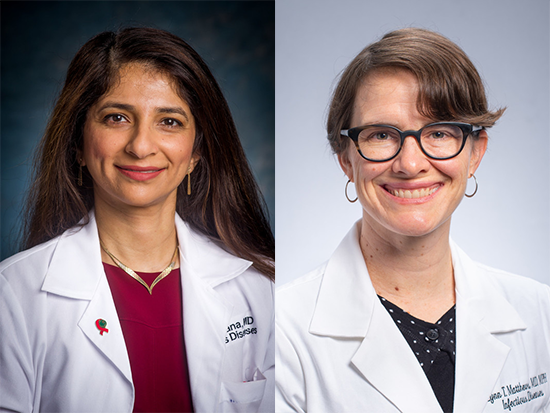 Aadia Rana, M.D., and Lynn Matthews, M.D.,
Aadia Rana, M.D., and Lynn Matthews, M.D.,
Photography by Steve Wood and Lexi CoonTwo University of Alabama at Birmingham Division of Infectious Diseases faculty have received an R01 grant from the National Institutes of Health to help end HIV in five Alabama counties.
Associate Professors Aadia Rana, M.D., and Lynn Matthews, M.D., MPH, will work with the Alabama Department of Public Health and Mobile County Health Department to adapt tools that promote HIV testing, linkage to care, and rapid antiretroviral therapy to push five counties — Baldwin, Choctaw, Clarke, Monroe and Washington — in Alabama closer to meeting targets to end the HIV epidemic.
“Our partnership with UAB Center for AIDS Research and new funding from the NIH will further promote MCHD efforts to reduce HIV infections in Mobile by increasing testing and access to lifesaving treatment,” said Rendi Murphree, Ph.D., director of the Bureau of Disease Surveillance and Environmental Services with the Mobile County Health Department.
Results of this research will lay the groundwork for a larger implementation trial that will include rigorous evaluation of implementation strategies to integrate hree evidence-based interventions to promote testing, linkage and viral suppression into clinical and public health systems to meet the Ending the HIV Epidemic targets.
“The Mobile County Health Department model of care with an urban-centered public health clinic network providing satellite care to rural areas is mirrored throughout Alabama’s seven other public health districts, six of which are directly administered by ADPH,” Rana said. “We hope the proposed intervention, if successful, could be adapted throughout Alabama’s, and other similar rural state, public health networks.”
According to Rana, while some of the highest-burdened counties in Alabama have seen some decreases in HIV diagnosis rates over the past five years, Mobile County experienced a 32 percent increase in the HIV case rate in 2019 and consistently experiences the lowest rates of viral suppression statewide.
“As part of the federal plan to End the HIV Epidemic, Centers for AIDS Research are tasked with partnering with local organizations and public health agencies to develop, evaluate and implement interventions to improve HIV prevention, testing, linkage, and adherence to care and treatment,” Matthews said. “We are thrilled to partner with the Mobile County Health Department, Alabama Department of Public Health and UAB CFAR collaborators in data science, epidemiology and implementation science to conduct this work.”
Rana adds that understanding local context is critical to developing and evaluating programs to effectively implement evidence-based interventions to end the HIV epidemic.
“As Alabama is one of the seven priority states in the EHE initiative, and the only one of the seven states with an NIH-funded CFAR, it is important for the UAB CFAR to partner with communities to end HIV in Alabama, and to take the lessons from our approach to other areas in the South,” Rana said.